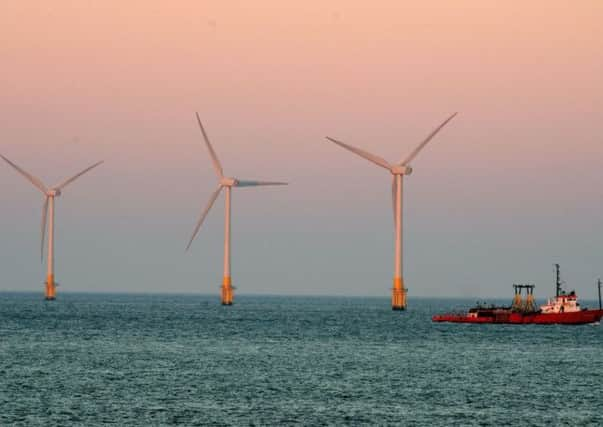Leaders: Time to speed up offshore approvals


There is no doubt that there is a slowdown in deployment of offshore turbines. According to Scottish Renewables, the industry’s trade body, only £29 million was spent on offshore energy in 2013, less than half the amount spent the previous year. It blames delays in the planning process which, it says, are holding up development of offshore wind farms with a capacity of 5 gigawatts – or twice the generating power of Longannet power station.
Offshore wind farms, save for the likes of Donald Trump, are much less controversial than the onshore variety, so it is not public opinion that is the problem. The difficulty may lie in assessing the impact that they could have on the marine environment. One of the reasons that ScottishPower shelved its plan to develop a wind farm off the coast of Tiree was the risk that damage could be done to the large population of basking sharks that cruise through those waters.
Advertisement
Hide AdAdvertisement
Hide AdEven so, working out the likely impacts on the sea and the seabed ought not to be so difficult as to cause the kind of delays that are now being experienced by the industry. And the offshore oil and gas industry, which arguably can have a much greater environmental impact, has managed to expand without much in the way of complaints of planning delays from oil companies.
Some uncertainty was caused last year by worry over the value of subsidies that the UK and Scottish governments would make available to offshore generators. This issue has, however, been resolved and the terms which are now available – a price of £155 per megawatt hour of electricity, three times the wholesale price and about 60 per cent more than is available to onshore wind generators – is generous enough to ensure generators should be able to earn a decent return.
Given the need for a fairly rapid expansion of offshore wind generation in order to meet climate change targets, and to realise the economic boost which should accompany such growth, it seems odd that ministers are apparently happy to preside over a planning regime which is inhibiting growth.
These delays could also have a damaging effect on the prospects for the deployment of wave and tidal energy technologies. The promotors of these, which are likely to have bigger impacts on the marine environment than the installation of seabed towers for wind turbines, cannot have been given much confidence by this slowdown.
As offshore energy is likely to be the real future for renewables, ministers should find out what is causing the delays, eliminate them, and get on with approvals.
Nigella decision is a recipe for injustice
NIGELLA Lawson, the TV celebrity chef, confessed to using cocaine during the recent acrimonious trial of her household workers. She should therefore, according to the strict letter of the law, have been charged with the criminal offence of possessing a class A drug. But the Crown Prosecution Service has decided she will escape uncharged. Why?
There are several reasons why somebody might escape prosecution. One is that the person concerned has suffered enough in the court of public opinion. While Ms Lawson garnered some sympathy for the ordeal she was put through in court even though she was not the accused, but a witness, she also endured considerable public disapproval. This, however, is not an outcome that meets the demands of justice.
The main reason for not pursuing a prosecution is that it may not be in the public interest. And here, it has been decided that the public interest would not be served by prosecuting someone who admitted to a criminal offence in court because that would deter others from being candid, either when being interviewed by the police or when on the witness stand in court. This seems a dubious proposition. It invites the idea that witnesses in criminal trials could regard a court as a confessional, a place where all sorts of offences could be admitted if that is a necessary part of proceedings and where the reward is to be not prosecuted. Is this really a desirable development?
Advertisement
Hide AdAdvertisement
Hide AdMany people will not trouble themselves with these tricky questions. They are more likely to conclude that Ms Lawson went free simply because she is rich and famous. And that is definitely bad for justice.